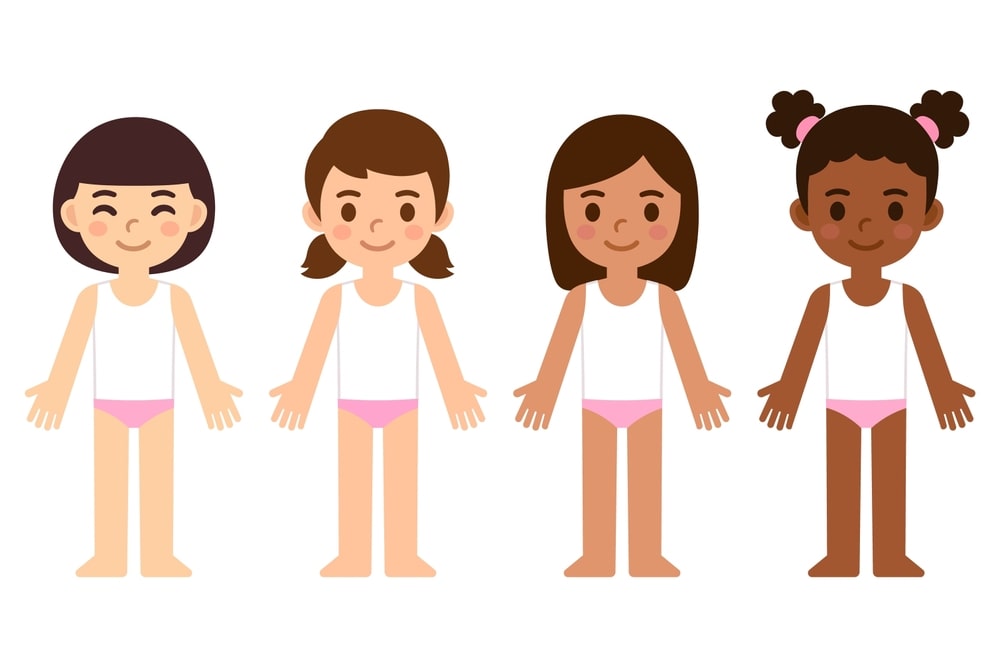What & Why Of Dusky Skin?
Dusky skin is a term used to describe a skin tone that is typically deeper than fair or light skin tones. It is characterized by an undertone that can range from warm (yellow or golden) to cool (pink or blue). Dusky skin is caused by the presence of melanin, the pigment that gives color to the skin, hair, and eyes. People with dusky skin tones have more melanin in their skin than those with fair or light skin tones.
The term “dusky” is often used to describe a skin tone that is dark or medium brown, but it can also refer to a wide range of skin tones that fall within the spectrum of dark skin. It’s important to note that the term “dusky” is often considered to be a more neutral or positive term than other terms used to describe dark skin tones, such as “dark-skinned” or “brown-skinned.”
The reason why dusky skin is caused by melanin is that melanin is the pigment that gives color to the skin, hair, and eyes. Melanin is produced by cells called melanocytes, which are found in the bottom layer of the epidermis (the outermost layer of the skin). Melanocytes produce more melanin in response to sun exposure, which is why people with dusky skin tones may become darker or tan more easily than people with fair or light skin tones.
How Do You Know If You Have Dusky Skin?
There are several ways to determine if you have dusky skin:
Look at the veins in your wrist: If your veins appear to be green or olive, it is likely that you have dusky skin with warm undertones. If they appear blue or purple, it is likely that you have cool undertones.
Look at how your skin reacts to the sun: If your skin tends to turn golden brown or bronze when exposed to the sun, it is likely that you have dusky skin.
Compare your skin tone to a color chart: Look at various color charts that illustrate different skin tones, and compare your skin tone to the colors on the chart. If your skin falls into the dusky category, it is likely that you have dusky skin.
Consult a dermatologist or makeup artist: They are experts in determining skin tones and can give you an accurate assessment of your skin tone.
It’s worth noting that some people have a skin tone that falls between dusky and another complexion, and some people have a mixed skin tone, for example, dusky with cool undertones, In this case, it is good to seek a professional advice.
What Is The Difference Between Dark Skin & Dusky Skin tone?
Dark skin and dusky skin are often used interchangeably, but there are some subtle differences between the two terms.
Dark skin refers to skin that is naturally darker in color, regardless of undertone. It can range from a light brown to a deep brown. People with dark skin typically have more melanin, which is the pigment that gives color to the skin, hair, and eyes.
Dusky skin, on the other hand, refers to a specific type of dark skin that is characterized by its warm undertones. Dusky skin can also range from light to dark, but it typically has a golden or olive undertone.
In summary, while all dusky skin is dark, not all dark skin is dusky. Dark skin can refer to any skin tone that is darker in color, whereas dusky skin specifically refers to a dark skin tone with warm undertones.
Embrace your natural skin tone: Dusky skin is beautiful, and you should be proud of your unique complexion. Embrace your natural skin tone and don’t try to change it with harsh bleaching products.
Use makeup to enhance your features: Use makeup to accentuate your best features and create a flawless complexion. Use a concealer and foundation that match your skin tone, and use bronzer and blush to add a warm glow to your skin.
How Can You Look Beautiful In Dusky Skin Tone?
Experiment with different hair colors: Dusky skin looks great with warm-toned hair colors such as copper, golden blonde, and caramel. Try different shades to see which one you like the most.
Dress in colors that complement your skin tone: Earth tones, jewel tones, and warm colors are all great options for dusky skin. Experiment with different colors to see what looks best on you.
Take care of your skin: A healthy and well-maintained skin is the foundation of any beautiful look. Make sure to cleanse, moisturize, and protect your skin from the sun.
Confidence is key: Confidence is the most important factor in looking beautiful. Be confident in your own skin, and that confidence will shine through in everything you do.
Consult a professional: A makeup artist or hairstylist can help you identify the best colors and styles that complement your skin tone and features.
Makeup Tips For Dusky Complexion
• Choose the right foundation: When choosing a foundation, it’s important to select one that matches your skin tone as closely as possible. People with dusky skin tones should look for foundations that are slightly darker than their natural skin tone to ensure a perfect match.
• Use a concealer: To conceal dark circles, blemishes, and other imperfections, use a concealer that is slightly lighter than your foundation. This will help to brighten up your skin and create a more even complexion.
• Try warm-toned makeup: Warm-toned makeup, such as bronzer, blush, and eyeshadow, can help to enhance the natural warmth of dusky skin tones.
• Use a good powder: A good powder can help to set your foundation and concealer, and also give a matte finish to your face, which is important for oily skin.
• Add a pop of color: Dusky skin tones look great with bold, bright colors, so feel free to experiment with different shades of lipstick, eyeliner, and eyeshadow.
• Highlight your features: Highlighting can be a great way to add dimension to your face and make your features pop. Use a highlighter on your cheekbones, temples, and other areas of your face that you want to accentuate.
Hair Colors For Dusky Skin Tones
Warm shades: Warmer shades such as copper, golden blonde, caramel and auburn can complement dusky skin tones very well. These shades have a yellow or orange base which can help to bring out the warmth in the skin.
Dark shades: Dark shades like black, dark brown, and espresso are also a great option for dusky skin tones. These shades can create a striking contrast and give a dramatic effect.
Natural hues: Natural hues like dark blonde, chestnut, and dark red can be a great option for dusky skin tones. These shades are subtle, but can still add depth and dimension to your hair.
Bold shades: For those who like to experiment, bold shades like purple, blue, and pink can also look great on dusky skin tones. These shades can add a pop of color and make a statement.
Highlights: Adding highlights can also be a great way to add dimension and interest to your hair. For dusky skin tones, highlights in shades like caramel, honey, and gold can complement the skin well.
It is important to note that hair color may look different on every individual, it is recommended to have a consultation with a professional stylist to determine the best hair color for you, considering factors such as your natural hair color, skin tone, and desired style.
What Color Clothes Go Well With The Dusky Skin Tone?
Earth tones: Earth tones such as brown, beige, and olive green can complement dusky skin tones well. These shades can bring out the warmth in the skin and create a natural look.
Jewel tones: Jewel tones such as emerald green, ruby red, and sapphire blue can also look great on dusky skin tones. These shades can add a pop of color and create a bold look.
Bright colors: Bright colors such as yellow, orange, and pink can also look great on dusky skin tones. These shades can bring out the warmth in the skin and create a fun, lively look.
Neutrals: Neutral shades like white, black, and gray can also be a great option for dusky skin tones. These shades can create a sleek, sophisticated look.
Pastels: Pastel shades such as light pink, baby blue, and lavender can also look great on dusky skin tones. These shades can add a soft, delicate look.
It is important to note that color preference is a personal choice, and what looks good on someone else may not necessarily look good on you. It’s also good to experiment with different colors to see which ones you feel most comfortable and confident in.
How To Identify Each Skin Type And Take Care Of Them?

There are four main skin types: normal, oily, dry, and combination. Here is how to identify each skin type and how to take care of them:
Normal skin: Normal skin is well-balanced and has a healthy appearance. It is neither too oily nor too dry and has minimal imperfections. To take care of normal skin, cleanse with a gentle cleanser and use a light moisturizer. Use sunscreen daily to protect the skin from sun damage.
Oily skin: Oily skin is characterized by an excess of oil production, which can lead to acne and blemishes. To take care of oily skin, use a cleanser specifically formulated for oily skin, and use oil-free moisturizer. Exfoliate regularly to remove dead skin cells and unclog pores.
Dry skin: Dry skin is characterized by a lack of oil production, which can lead to flaking, itching, and redness. To take care of dry skin, use a gentle cleanser and a moisturizer specifically formulated for dry skin. Avoid hot showers and baths, which can strip the skin of its natural oils.
Combination skin: Combination skin is characterized by a combination of oily and dry areas. The T-zone (forehead, nose, and chin) is usually oily, while the cheeks are dry. To take care of combination skin, use different products for different areas of the face. Use a cleanser specifically formulated for oily skin on the T-zone and a gentle cleanser on the cheeks. Use a light moisturizer on the T-zone and a heavier moisturizer on the cheeks.
It’s important to note that skin can change over time and be affected by different factors such as weather, hormones, and skincare routine, so it’s good to regularly check your skin type.
Summary
Dusky skin is a term used to describe a skin tone that is typically deeper than fair or light skin tones. It is characterized by an undertone that can range from warm (yellow or golden) to cool (pink or blue) and caused by the presence of melanin, the pigment that gives color to the skin, hair, and eyes. The term “dusky” is often considered to be a more neutral or positive term than other terms used to describe dark skin tones.




